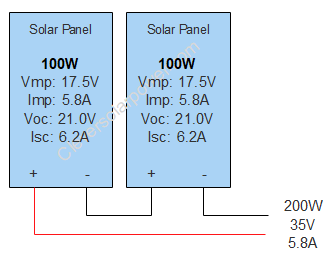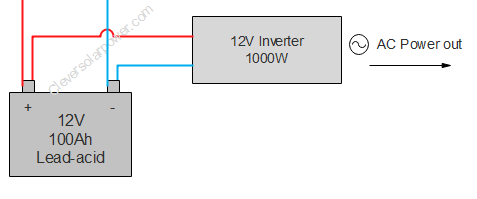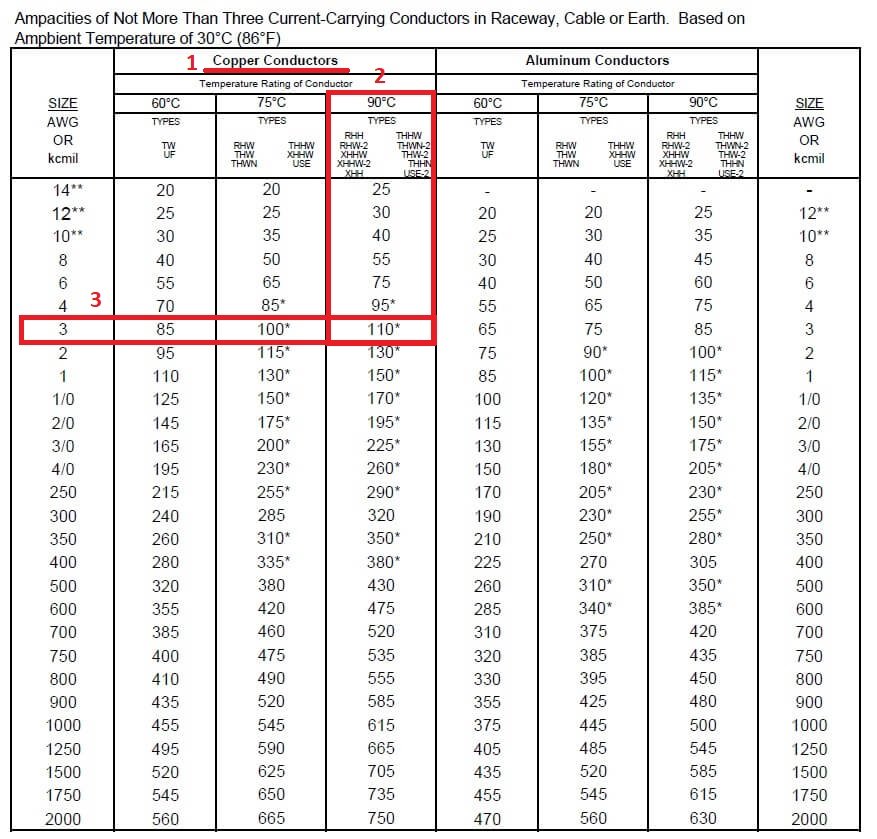In this article, I’m going to explain how to size your wires for a solar system.
I have also made a video about this, watch it here:
The wires will range from the solar panels to the charge controller, busbar, and inverter.
To start with, we can divide the calculations into two parts. These are:
- Wiring the solar panels to the charge controller (lengthy wires)
- Wiring the components together (short wires)
Calculating Wire Size for Solar Panels
The wires from the solar panels to the charge controller will be lengthy. That’s why we need to use a different calculation based on voltage drop. If you don’t know what voltage drop is, I recommend watching my video here.
In the following image, you can see two solar panels connected in series. As you already might know, in series, the voltage gets added up.

First, we must calculate the maximum amount of current going through the wire.
Imax = Isc * 1.5623 (safety factor) = 6.2A * 1.5623 = 9.7A
Let’s say the length of the wires is 30ft to the charge controller. We now have to use a voltage drop calculator to figure out which wire we need.
We will enter the following values into the calculator:
- Wire length
- Voltage (Vmp * 2 panels)
- Max current

Now we need to adjust the wire size diameter for the voltage drop to become less than 3%. In this case, we will need a 12AWG or 4mm² wire.
There you have it! That’s how you calculate the wire thickness for solar panels.
If you have these two solar panels wired in parallel, you double the current instead of the voltage.
Calculating Wire Size for Solar Components
In the second part of this guide, we will calculate the wires that connect the charge controller, battery, busbar, inverter, and DC fuse box.
These wires can be calculated using a simple technique. Instead of a calculator, I will show you how to calculate them easily.
Let’s use the following example of a cable from the battery to the inverter.

We have a 1,000W inverter which is connected to a 12V battery. We have to calculate the current that can go through this wire:
1,000W/12V=83A
Now we need to apply several safety factors concerning the temperature of the wire. To make it easy, we will use 125% of the current. We get the following:
83A*1.25=104A
This means we need to find a cable that can carry 104Amps. Then we will use the following table to find one:

Here I will explain the steps we need to follow:
- Locate the copper conductors.
- Select the insulation temperature of the wire. Cheaper wires will have less temperature rating resulting in less current capacity. Go down until you find the current you want your wire size to be. This need to be higher than the current we calculated. In this example, it’s 110A because we calculated 104A.
- Then go horizontally to the left until you see the cable gauge number (AWG). This is the size of conductor you will need.
We can see that we need a 3AWG copper cable that is rated for an insulation temperature of 90°C.
If you want to see this table without the red markings and where you can see a table converting AWG to mm², then look at this solar resources page.
| AWG | Metric (mm²) |
|---|---|
| 16 | 1.5 |
| 14 | 2.5 |
| 12 | 4 |
| 10 | 6 |
| 8 | 10 |
| 6 | 16 |
| 4 | 25 |
| 2 | 35 |
| 1 | 50 |
| 0 | NA |
| 2/0 | 70 |
| 3/0 | 95 |
| 4/0 | 120 |
Conclusion
There you have it!
Now you know how to calculate the wire size for any solar power system.
If you have questions/suggestions, leave a comment below.
Read next: How to select fuse size

I’m an off-grid enthusiast. I created this website to give clear and straight-to-the-point advice about solar power. I’m also the author of the book ‘Off-grid solar power simplified‘. Read more about me on my about page, check out my Youtube channel, or send me a message.
I’ve read your book cover to cover twice…extremley helpful as i want to expand my current RV solar system.
Thanks for a simple well written How To Book
Thanks Robert! Checkout my new video about it here.
Thank you for sharing so selflessly you wisdom.
Hi Nick,
Your works and efforts In one word: MARVELOUS!
Keep up the great work: it connects any light no matter how small the users light and / or knowledge is.
Thanks for your kind words Robert! I appreciate your support.
Hi Nick.I am a beginner and would like to know more about this. I have 2x300watt solar panels each with maximum power voltage of 18.4v and maximum power current of 7.44amp. The voc for each panel is 22.01v and is of 7.79amp. I also have another 300watt panel with Vmp of 18.8v and imp of 16.0amp.The voc of 22.4v and is of 20.5amp.I was just wondering if I should put these at parallel set-up with 10awg cable to a 60amp solar disconnect switch with 6awg cable to my mppt smart solar charge controller. Could you please advise if this is OK.
Please check my video about mismatched solar panels: https://youtu.be/OsOnDmPSwqA